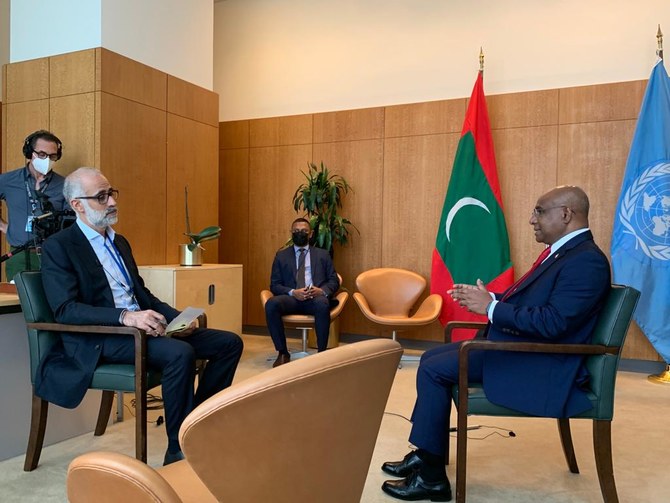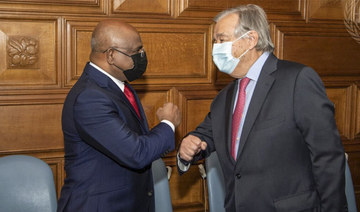NEW YORK: Maldivian diplomat Abdulla Shahid this week took the oath to become president of the UN General Assembly’s 76th session. In his first interview since taking office, he spoke exclusively with Arab News and shared his vision for what he intends to be a “presidency of hope.”
Arab News was the first media organization to visit his new office, newly vacated by previous occupant Volkan Bozkir at the conclusion of his one-year term as president.
We were greeted warmly not only by Shahid but many members of the team at the Maldivian UN mission. His election had been hailed as a great achievement for his small island nation and another step toward true representation at the UN.
Shahid, his country’s foreign minister, takes on his new UN role at a time when the world is mired in calamity. The COVID-19 pandemic continues to rage worldwide as wealthy nations hoard vaccines. The planet is sending daily warning signals that we can no longer afford to ignore the dangerous effects of climate change. Protracted conflicts continue to drive millions of people from their homes and into refugee camps.
At this time, one cannot help but wonder where exactly does hope reside and how do we reclaim it?
The Maldives, an island nation in the heart of the Indian Ocean, is the lowest-lying country in the world, with an average elevation of 1.5 meters, The natural high point of its territory is only 5.1 meters.
“Coming from the Maldives, the climate-change issue is an existential threat for us,” said Shahid. “We live every day, day in and day out, with the possibility of drowning. The sea levels are rising. The scientists are predicting that we have crossed the red line; 2040 is a date beyond the tipping point.
“But in the Maldives what we survive on is hope, because we have to believe in the common good of humanity.”
The common good has perhaps never been more considered and discussed than during the pandemic, which has plunged economies into depression and wreaked havoc on people’s lives through the deaths of loved ones, the loss of jobs, and lockdowns that create mental challenges for many.
“But there was a glimmer of hope in that: The selfless service of health workers, how they sacrificed themselves in spite of clear-cut dangers to themselves,” said Shahid.
“So we should not lose hope in humanity. The goodness of humanity is there — we have to make sure it thrives, we have (to) celebrate it. If we lose hope what is there for us? There’s nothing. The only thing we stand on is hope that the goodness of humanity will survive.”
On all the issues Shahid considers priorities, the writing has been on the wall for some time. Scientists and UN agencies know, for example, what needs to be done to mitigate climate change, slow the spread of COVID-19, and include the most vulnerable people in global rebuilding efforts.
The only thing that is lacking, one keeps hearing in the halls of the UN, is the political will to take action.
Since he was elected president of the General Assembly in June with a sweeping majority, Shahid has held meetings with representatives of every one of the UN’s 193 member states. As a result, he has a slightly different perspective on the question of will.
“I think there is great political will — it needs to be harnessed,” he said. “We are 193 countries. The UN Charter starts with these three words: ‘We the peoples.’ So the 193 countries are not 193 countries by themselves. They also constitute ‘We the peoples.’”
As an example, he said: “I’ve had the privilege of interacting with (UN Secretary-General Antonio Guterres’s) youth group of advisors on climate change. They are thinking outside the box. They are disappointed. They are talking of action. And they represent 1.8 billion youths in the world. And these 1.8 billion youths constitute 193 countries.
“So I can see the will. I can hear them loudly, clearly. All we need to do is for us to start listening.”
As it is in the Maldives, climate change is also an existential threat to many people in the oil-producing Gulf States. The region has for years been caught in a vicious cycle of rising temperatures that lead to increased use of air conditioners, which requires the burning of more fossil fuels to power them, causing temperatures to rise further still.
Shahid believes that the Kingdom’s plans for a Saudi Green Initiative and a Middle East Green Initiative, which were announced this year and will be officially launched in October, could completely reverse this course and set the region on the road to transformation.
“I salute the leadership of Saudi Arabia for the initiatives they have taken, the Saudi Green Initiative and the Middle East Green Initiative,” he said. “The planting of (billions of trees) is going to totally transform the landscape in the Middle East.
“The Saudi leadership is becoming an international champion in the field of addressing climate change, (like) so many other countries in the Gulf (such as) the UAE (and) Qatar.
“Being oil producing countries, the target they have set is outstanding. The leadership they are showing is outstanding. And I wish many many other countries in many other parts of the world would follow the Saudi leadership on this aspect of climate change.”
Shahid was only 26 years old when, as a young diplomat, he attended his first General Assembly session. It immediately convinced him that the way forward in finding solutions to the world’s problems lies in the multilateral system.
“Things are very interconnected,” he said. “What happens in one country has a ripple effect on many others. No country can survive on its own.”
The biggest threat to this multilateralist approach is “the tunnel vision of ultra-nationalism” which he described as “completely outdated.”
“Unity is the only solution,” said Shahid. “Look at COVID-19. The one thing that it has taught us, and we shouldn’t be blind to that, (is that) no one is safe until everyone is safe. It is the job of leaders here at the UN, (of) respected countries, to continue to give that message that unity is strength.”
As anyone who follows the work of the General Assembly and the Security Council knows, however, unity is a rare commodity. A web of tensions permeates the work of UN bodies.
Shahid said that the role of the General Assembly has evolved in the 75 years since the UN was founded, but a closer look at that evolution raises questions about whether it was all in the right direction. For example, it has oscillated between strongly advocating the Universal Declaration of Human Rights, which was first promulgated in the Assembly Hall, and being frozen by inertia on the issue.
Meanwhile one source of tension between member states concerns the relationship between smaller, developing countries who want more of a say in UN deliberations, and the rich nations who are the organization’s main donors.
It has not always been like this, however. The Uniting for Peace resolution in 1950, initiated by the US, states that if the Security Council “fails to exercise its primary responsibility for maintaining peace and security, the General Assembly should take up the matter itself and urge collective action.”
This resolution was acted upon during the Suez crisis of 1956, when UN intervention led to a ceasefire, the withdrawal of troops, and the establishment of the first peacekeeping force.
Almost half a century later, however, when the US invasion of Iraq in 2003 provoked calls from many organizations for the General Assembly to take on the issue and override a Security Council impasse, it declined to do so.
More recently, efforts to revitalize the work of the General Assembly have focused on increasing its power in relation to the Security Council, promoting greater transparency, and improving the quality of debates. Some say it is an important institution that has never quite sorted out its role as a truly deliberative and functional body.
The General Assembly has the power to censure states for violating the principles of the UN charter. In the 1960s, for example, it suspended the South African delegation from the UN because of the continued practice of apartheid, which was in violation of Security Council resolutions and international law. The country was only readmitted in 1994 following its democratic transition.
In August 2012, the General Assembly voted 133 to 12 to denounce the Syrian government for atrocities during the Syrian uprising. And in December 2019, it passed a nonbinding resolution condemning human rights abuses against the Muslim Rohingya in Myanmar.
According to Shahid: “The consensus of the General Assembly reflects the world’s conscience. That is the power of the General Assembly.”
One way to enhance this power and render debates more deliberative, he said, is by inviting “other voices” to speak, including representatives of civil society, academics, scientists, gender experts and youth.
With the participation of such voices “the General Assembly will thrive,” Shahid added.
The Security Council, meanwhile, should “reflect the current realities of the world,” he said, and reforms of the council should be expedited because its very credibility is at stake.
An element at the heart of Shahid’s agenda, and vital for any reforms to even begin, is the inclusion of women.
“Women have been exploited, trampled upon, suppressed for far too long; we shouldn’t be accepting it,” he said as he called on all who have not yet become “gender champions” to join the fight.
In what is perhaps one of his most radical positions, he vowed in his new role not to take part in any panel that is not gender balanced.
“My staffers have told me that it will be a difficult one to keep but I told them that it is their job to make sure panels are gender balanced,” Shahid said.
“And for me as the president, it is very simple: I will say, ‘No, if there is no gender balance I will not attend.’ And that statement itself, coming from the president of the General Assembly, is a strong message and it will be respected. And I hope that if they want me to be on these panels they will make them gender balanced.
“The next time, such organization or associations (organize) panels they will always recall that President Shahid insisted that panels need to be gender balanced.”
To those who continue doubt the necessity or suitability of women in leadership positions and decision-making roles, Shahid’s message could not be simpler.
“If the person who is doubting the role of women is a man, I would ask the person to just sit down and think: Where did they come from? Who carried the person for nine months? The mother,” he said. “It’s very simple: Respect your mother. Give your mother the respect that she deserves.
“And when you have a daughter, look at her, see whether you would want your daughter to suffer. Give respect to your daughter — it’s very personal.”
Failure to recognize the importance and value of women means that the world is wasting one of its great human resources, Shahid said.
“The world is made up of men and women. If we want to lock (away) half of the world population and not benefit from them, we are utilizing (only) 50 percent of the population,” he said. “Does that make sense at an economic level? At a humanitarian level? At a social level?
“It does not take a genius to say simply that the only way humanity will progress is (if we) respect women.”























